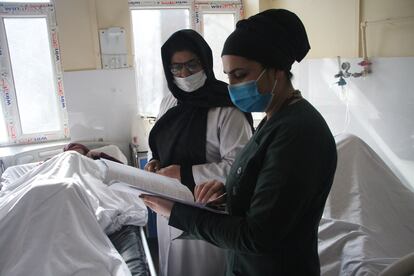Afghan religious scholars criticize girls’ education ban
The Taliban have barred girls from school beyond sixth grade, including university. They present the restrictions as temporary suspensions, but there is no sign of change as schools and universities reopened in March without their female students

Afghan religious scholars Saturday criticized a ban on female education, as a key Taliban minister warned clerics not to rebel against the government on the controversial issue.
Girls cannot go to school beyond sixth grade in Afghanistan, with the education ban extending to universities. Women are barred from public spaces, including parks, and most forms of employment. Last week, Afghan women were barred from working at the U.N., according to the global body, although the Taliban have yet to make a public announcement.
Authorities present the education restrictions as temporary suspensions rather than bans, but universities and schools reopened in March without their female students.
The bans have raised fierce international uproar, increasing the country’s isolation at a time when its economy has collapsed and worsenend a humanitarian crisis.
Two religious scholars who are well-known within Afghanistan said Saturday that authorities should reconsider their decision. Public opposition to Taliban policies is rare, although some Taliban leaders have voiced their disagreement with the decision-making process.
One scholar, Abdul Rahman Abid, said institutions should be permitted to re-admit girls and women through separate classes, hiring female teachers, staggering timetables, and even building new facilities.
Knowledge is obligatory in Islam for men and women, he told The Associated Press, and Islam allows women to study.
“My daughter is absent from school, I am ashamed, I have no answer for my daughter,” he said. “My daughter asks why girls are not allowed to learn in the Islamic system. I have no answer for her.”
He said reform is needed and warned that any delays are at the expense of the global Islamic community and also weakens the government.
Another scholar, who is a member of the Taliban, told the AP there is still time for ministries to solve the problem of girls’ education. Toryali Himat cited ministries comprising the inner circle of the supreme leader, Hibatullah Akhundzada, who is based in Kandahar.
It was on his orders that the government banned girls from classrooms. Himat said there are two types of criticism, one that destroys the system and another that makes corrective criticism.
“Islam has allowed both men and women to learn, but hijab and curriculum should be considered,” said Himat. “Corrective criticism should be given and the Islamic emirate should think about this. Where there is no criticism, there is the possibility of corruption. My personal opinion is that girls should get education up to university level.”
Acting Higher Education Minister Nida Mohammad Nadim said Friday that clerics should not speak against government policy.
He made his remarks after another scholar, Abdul Sami Al Ghaznawi, told students at a religious school that there was no conflict over girls’ education. He said Islamic scripture was clear that girls’ education was acceptable. Al Ghaznawi was not immediately available for comment.
Nadim appeared to target Al Ghaznawi by mentioning “an honorable scholar” at the top of a video statement released on social media.
“You encouraged the people to rebel, so what is the result?” Nadim said. “The result is that rebellion against this (ban) is allowed. If people are encouraged to rebel against the system, will it benefit Muslims?”
The minister was not immediately available for comment. But his spokesman, Hafiz Ziaullah Hashimi, confirmed Nadim’s remarks without giving further details about who they were directed at or the reason behind them.
Sign up for our weekly newsletter to get more English-language news coverage from EL PAÍS USA Edition
Tu suscripción se está usando en otro dispositivo
¿Quieres añadir otro usuario a tu suscripción?
Si continúas leyendo en este dispositivo, no se podrá leer en el otro.
FlechaTu suscripción se está usando en otro dispositivo y solo puedes acceder a EL PAÍS desde un dispositivo a la vez.
Si quieres compartir tu cuenta, cambia tu suscripción a la modalidad Premium, así podrás añadir otro usuario. Cada uno accederá con su propia cuenta de email, lo que os permitirá personalizar vuestra experiencia en EL PAÍS.
¿Tienes una suscripción de empresa? Accede aquí para contratar más cuentas.
En el caso de no saber quién está usando tu cuenta, te recomendamos cambiar tu contraseña aquí.
Si decides continuar compartiendo tu cuenta, este mensaje se mostrará en tu dispositivo y en el de la otra persona que está usando tu cuenta de forma indefinida, afectando a tu experiencia de lectura. Puedes consultar aquí los términos y condiciones de la suscripción digital.








































